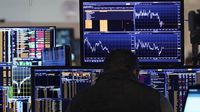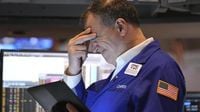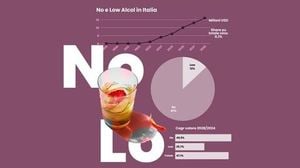In a dramatic turn of events, U.S. stock markets fluctuated significantly following the announcement of new import tariffs, leading to an overall decline in major technology stocks. On April 3, 2025, the S&P 500 futures dropped by three percent, while the Nasdaq futures plummeted almost four percent, indicating a challenging opening for U.S. markets.
The news of the tariffs, which are set to impose a 25 percent duty on passenger cars, light commercial vehicles, and certain auto parts, sent shockwaves through the global economy. Analysts predict that these tariffs will have far-reaching consequences, particularly for the automotive industry. Hildegard Müller, president of the German Association of the Automotive Industry (VDA), expressed concerns, stating, "The consequences of the 25 percent tariffs are difficult to estimate, but it is clear that this development will have negative impacts on global economic growth and could cost jobs."
In the aftermath of the tariff announcement, major tech stocks suffered considerable losses in after-hours trading. Apple saw a sharp decline of 6.1 percent, while Microsoft fell by two percent. Other notable drops included Nvidia at 4.7 percent, Amazon at five percent, and Tesla, which dropped by 5.9 percent. These declines reflect investors' anxieties surrounding the economic implications of the tariffs.
Meanwhile, the Nikkei index in Tokyo also experienced a significant downturn, falling by more than three percent at the start of trading. This trend suggests that the impact of the U.S. tariffs is being felt internationally, raising alarms among investors across the board.
In an effort to mitigate potential fallout, investors turned to gold, traditionally viewed as a safe haven during times of market volatility. The price of gold surged to a record high of over $3,170 per fine ounce, driven by fears of inflation resulting from the new tariffs. Tai Wong, an independent metal trader, noted, "The retaliatory tariffs are significantly more aggressive than expected." He anticipates further increases in gold prices as investors seek refuge from the uncertainty in the stock market.
Adding to the economic apprehension, the director of the U.S. Federal Reserve, Adriana Kugler, recommended a pause in interest rate cuts, citing the inflationary effects of the tariffs as a key factor. The Fed is scheduled to review interest rates again on May 7, 2025, and the upcoming decision will be closely watched by market participants.
In Europe, industries are bracing for significant challenges as well. French wine and spirits exporters are forecasting a sales decline of at least 20 percent due to the tariffs. The industry's trade association emphasized the potential devastation these new tariffs could wreak on their market.
As the day progressed, the Dow Jones Industrial Average managed to close 0.56 percent higher at 42,225 points, while the Nasdaq 100 ended with a gain of 0.75 percent at 19,581 points. This resilience in the U.S. markets came despite the looming uncertainty surrounding the tariffs.
Earlier in the week, on April 2, 2025, the Dow had initially faced a rocky start but recovered as optimism regarding the potential long-term benefits of the tariffs emerged. Investors speculated that the tariffs could ultimately benefit the U.S. economy by encouraging domestic production.
On the same day, the U.S. industry reported a 0.6 percent increase in order intake for February, marking a second consecutive month of growth. Orders for durable goods also rose by 1.0 percent, up from a previous estimate of 0.9 percent, further supporting the notion of economic recovery.
Despite the positive data, uncertainty loomed over the markets. Experts from Dekabank noted, "Capital markets and companies do not favor uncertainty, and it remains questionable whether clarity will be achieved today."
In the commodities market, oil prices fluctuated as well. Brent crude oil from the North Sea rose by 0.75 percent to $74.96 per barrel, recovering from earlier losses. The OPEC+ coalition began to gradually reduce its voluntary production cuts, increasing daily oil production by nearly 140,000 barrels per month starting in April.
In the corporate arena, Siemens announced its acquisition of Dotmatics, a Boston-based software company specializing in research and development for the pharmaceutical industry, for $5.1 billion. This move aligns with Siemens' growth strategy to enhance its position in industrial software.
Meanwhile, the online used car dealer Auto1 reported its first-ever consolidated profit of €20.9 million last year, a significant turnaround from a loss of €116.5 million in the previous year. This positive development was met with cautious optimism from investors, although some chose to take profits after the announcement.
In the automotive sector, BMW reported a 3.7 percent increase in U.S. sales for the first quarter, delivering 87,615 vehicles. Volkswagen also enjoyed a 7.1 percent increase, selling 87,915 vehicles during the same period. These figures indicate a robust demand for vehicles despite the impending tariffs.
As the market reacts to the tariff news, investors remain on edge, weighing the potential benefits against the risks posed by escalating trade tensions. The coming weeks will be critical as businesses and consumers alike navigate the evolving landscape shaped by these new economic policies.
The unfolding situation underscores the interconnectedness of global markets and the delicate balance between trade policies and economic stability. As stakeholders brace for the impact of these tariffs, the sentiment in financial markets remains cautious, with many looking for signs of recovery or further downturns in the days to come.





